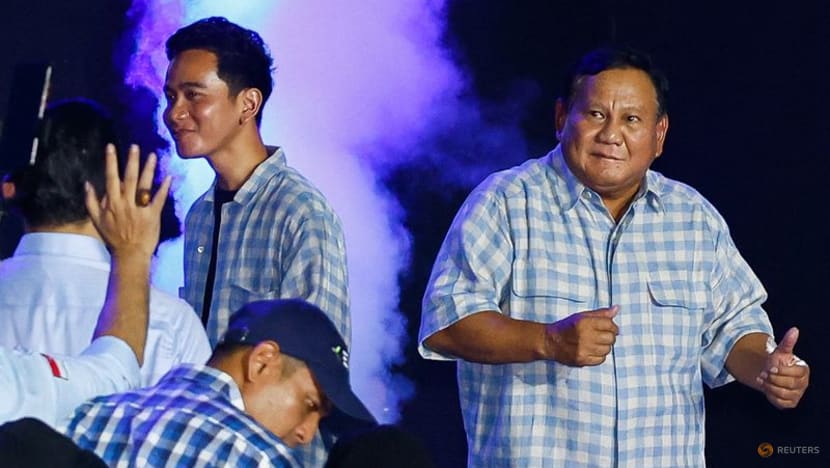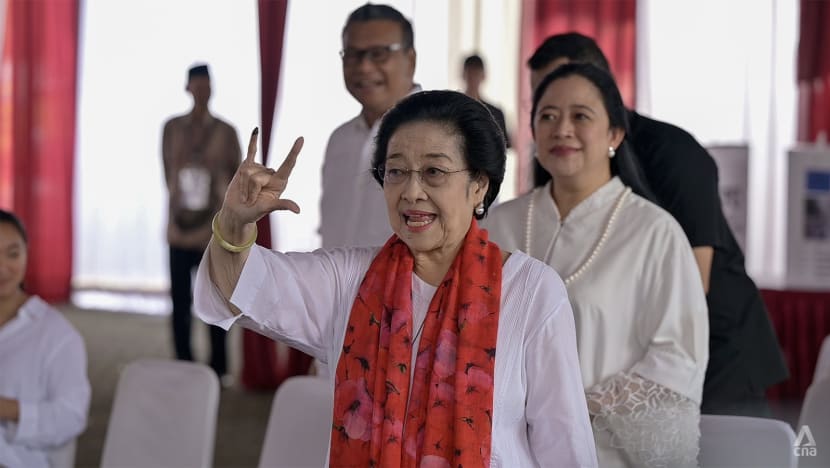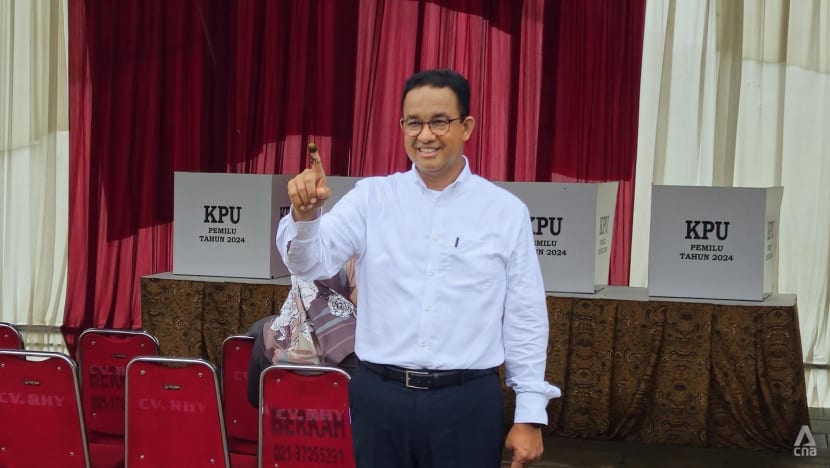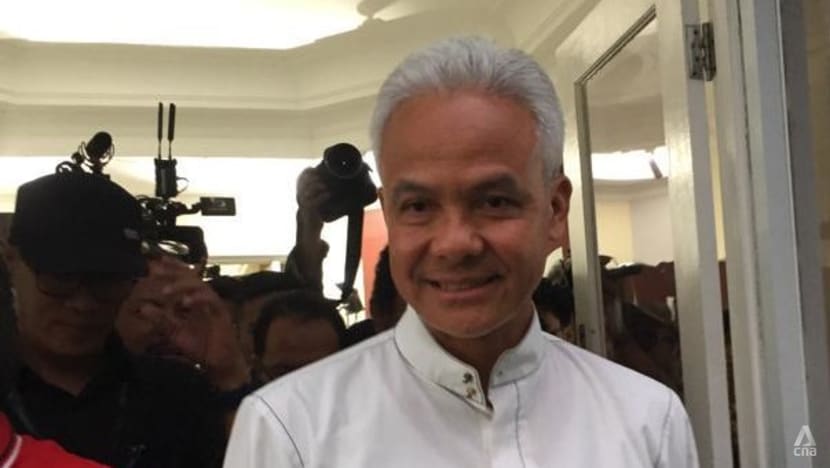Indonesia’s tight legislative election sees PDI-P with a slight lead; potentially problematic for Prabowo’s camp
In the legislative polls, about 9,900 candidates vied for the 580 seats in parliament, also known as the House of Representatives.


This audio is generated by an AI tool.
JAKARTA: The proverbial dust may have settled in Indonesia’s presidential election with Defence Minister Prabowo Subianto claiming victory over rivals Anies Baswedan and Ganjar Pranowo, but the race to control the legislature remains tight.
Exit polls show that the current ruling party - the Indonesian Democratic Party of Struggle (PDI-P) - is leading slightly over other political parties.
The latest results by several reputable pollsters such as Indikator Politik Indonesia and Lembaga Survey Indonesia, show that PDI-P - which is the political party of former Central Java governor Ganjar - has about 17 per cent of the votes with about 85 per cent of the sample results counted.
Indonesia’s oldest-running political party Golkar and Mr Prabowo’s Great Indonesia Movement Party (Gerindra) are in second and third place with 15 per cent and 13 per cent of the votes respectively, according to Indikator Politik Indonesia.
Analysts whom CNA spoke to said that a legislature controlled by PDI-P could spell trouble for Mr Prabowo, as this would mean he may not be able to rule effectively without securing a majority in parliament.
“If Mr Prabowo becomes the next president, but PDI-P controls the parliament, the government won’t be able to rule effectively,” said Mr Wasisto Raharjo, a political analyst with the Indonesian National Research and Innovation Agency (BRIN).
To avert this scenario, the Prabowo-led Advanced Indonesia Coalition - which counts Gerindra and Golkar among its members - will need to expand its coalition to secure a parliamentary majority to avoid potential gridlock with a PDIP-led parliament, analysts said.
In the legislative polls, about 9,900 candidates vied for the 580 seats in parliament, which is also known as the House of Representatives.
Given the large number of voters - there are some 205 million registered voters across the archipelago - the General Elections Commission (KPU) has said that official results are expected to be released by March 20 at the latest.

NEED TO FORM A COALITION
Parties within the Advanced Indonesia Coalition that support Mr Prabowo and his running mate Gibran Rakabuming Raka for the presidency and vice-presidency are likely to remain together in parliament and form a bloc, Mr Wasisto told CNA.
These include Gerindra, Golkar, the National Mandate Party (PAN) as well as the Democratic Party.
Based on current preliminary quick count results, together they make up about 42 per cent of the votes sampled so far.
Mr Wasisto said Gerindra and its coalition would need to convince other parties to join their coalition so that they can become a solid bloc in parliament.
He warned that they would need to do this before PDI-P asks the remaining parties - namely the National Democratic Party (Nasdem), the National Awakening Party (PKB) and the Prosperous Justice Party (PKS) - to form a coalition, resulting in potentially becoming the bigger power and voting bloc in parliament.
Nasdem, PKB and PKS had backed Mr Anies and his running mate Muhaimin Iskandar in the presidential election.

If PDI-P, Nasdem, PKB, and PKS were to join forces and form a coalition, they would make up about 46 per cent of the votes sampled so far.
This may then result in disruptions to the implementation of government policies and budget planning because the two political powers - the executive and legislative - are being controlled by opposing ends.
“It (the government) won’t be smooth,” said Mr Wasisto, adding that there will be a lot of lobbying every time the government would want a Bill to be passed as a law.
Mr Wasisto also believes Mr Prabowo will have more politicians than technocrats in his Cabinet because he needs to have people who are good lobbyists.
“Because those who can negotiate and lobby well are only politicians. Not technocrats nor bureaucrats.
“So there will be many senior politicians who are experienced in negotiating deals and dealing with differences (in the Cabinet),” he surmised.
During the campaigning period in the lead-up to the Valentine’s Day election on Feb 14, Mr Prabowo was backed by many influential figures serving in the current administration under President Joko Widodo - Mr Gibran’s father.
These include Coordinating Minister for Economic Affairs and Golkar’s chairman Airlangga Hartarto, Minister of State-Owned Enterprises Erick Thohir and PAN chairman Zulkifli Hasan.
Mr Wasisto believes they will most likely continue to serve as ministers in Mr Prabowo’s Cabinet.
WILL PDI-P JOIN PRABOWO’S FOLD?
In another potential scenario, political analyst from the Centre for Strategic and International Studies (CSIS) Nicky Fahrizal said that Mr Prabowo’s Gerindra party may ask the PDI-P to join its coalition.
Mr Nicky noted that Mr Prabowo appears to have a leadership style similar to that of Mr Widodo, who tried to work with everyone and ended up having the backing of more than 80 per cent of the parliament towards the end of his second term.
Jokowi, as the president is popularly known, is barred by the country’s Constitution from seeking a third term in office.
However, given that PDI-P backed its member Ganjar during the presidential election, Mr Nicky thinks the party will likely be an opposition in parliament.
“From my point of view, based on the current political situation, it seems PDI-P will be in the opposition camp.
“And as an opposition, PDI-P has a very strong history in parliament,” he said, adding that the party led by chairperson Megawati Soekarnoputri could become an effective check and balance in parliament should it find another party to ally with.
PDI-P was an opposition party from 2004 to 2014 when it lost the presidential election in 2004 and 2009 and came in second and third in those respective years.

HORSE-TRADING A FORM OF POLITICAL CURRENCY
Mr Nicky noted that the different scenarios depend on what Mr Prabowo - as the likely presidential winner - has to offer the other parties. These may include offering them a seat as a minister in his Cabinet, considered to be the norm in Indonesia.
In claiming victory on Wednesday night, Mr Prabowo told his supporters at the Istora Senayan stadium in Jakarta to wait for the official tally by the KPU.
Political lecturer from the University of Indonesia Aditya Perdana believes there is little value for political parties to be in the opposition.
Given that political parties in Indonesia tend not to work based on ideologies but rather on benefits, Mr Aditya said that he thinks some parties would rather join forces with Mr Prabowo and his coalition, even if they campaigned for different things and ideologies during the election.
“It will be more promising and beneficial for parties to join the government than to be an opposition.
“It will be easier for them to maintain their constituents and voters if they are in power. So it will be just pragmatic,” said Mr Aditya.
He also highlighted that Indonesia will hold local elections in November, where voters will choose governors and other local leaders.
Thus, political parties would consider this before making the next move.
Mr Aditya surmised that, ultimately Mr Prabowo is not in a rush to form a coalition in the parliament, and any party can join later on.
The newly elected members of parliaments will only be inaugurated on Oct 1, while the president and vice-president will be sworn in on Oct 20.
“In Indonesian politics, anything can happen. Because here, everyone tries to accommodate the needs of others.
“They are not very ideological,” said Mr Aditya.


















